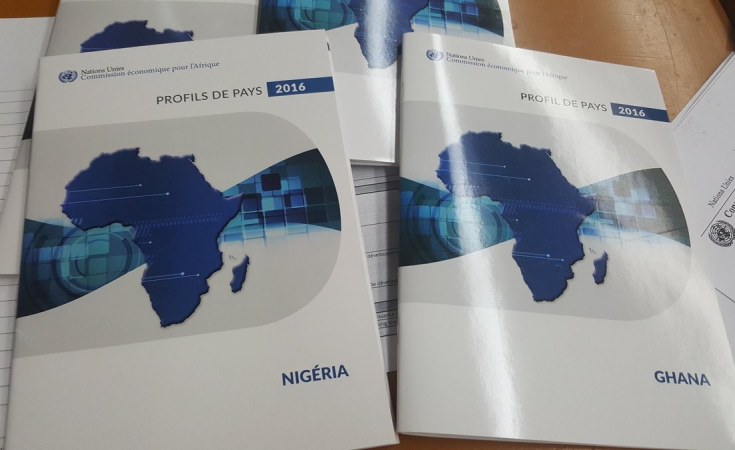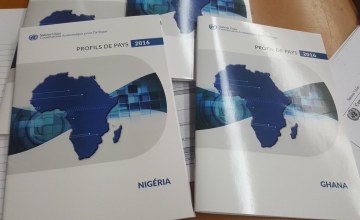Dakar, 25 March 2017 (ECA) - Southern African countries surveyed in the Economic Commission for Africa’s (ECA) latest Country Profiles are looking at accelerating the pace of their economic diversification in a bid to address the economic, social and human challenges they face as well as – for three of them - to break away from their dependency on a single commodity.
The 2016 reviews, which were launched during the African Development week in Dakar, Senegal, say that Angola, Malawi, Mauritius, Mozambique, South Africa and Swaziland are grappling generally with the challenge of structural transformation and seek to address it through infrastructure development.
In Angola, for instance, where oil remains the main foreign currency earner, focus has shifted to a wide range of sectors, including agriculture and hard rock mining. The Government has undertaken a number of multimillion-dollar projects to develop roads, railways, ports and aviation, energy and water, and telecommunications.
Mozambique had in 2016 allocated 9.6 per cent of the national budget for agriculture and rural development, showing the government remained committed to enhancing the agriculture sector as an important component of its economic transformation strategy, developing value chains.
The Malawi report on its part says that the country, whose economic performance is largely dependent on tobacco production and export, is taking concerted policy actions to diversify its productive base by promoting opportunities for value addition in the cereals, forestry, agroforestry, fisheries, tourism, and small-scale artisanal mining sectors.
Swaziland, which is currently dependent on Southern African Customs Union (SACU) revenues to finance Government spending, is aiming to mobilize alternative revenue sources and boost private investment. The government views FDI as a potential driver for economic growth and as a result, structural reforms to stimulate private sector-led growth and catalyze industrialization and structural transformation are being pursued, along with the promotion of micro, small and medium scale enterprises.
To accelerate Mauritius transition from an export-oriented manufacturing-based economy into a high-income services-based country, the Government has been implementing a number of policies and programs intended to alleviate structural unemployment, ensuring that the workforce is equipped with the skills it needs to excel in the jobs of the future.
The South African report highlights the government’s focus towards programs and labor policy reforms, which address income, human capital and asset poverty to remedy severe racial, gender, and geographical inequalities. It also takes a look at concerted efforts to revive the manufacturing sector, including textiles, and to reform the education sector to enhance skills, value addition in the resources sector, investment in the energy sector.
The 2016 Country Profiles also use indexes to review the six Southern African countries’ performances in the fields of regional integration, Health, Education, Poverty reduction, Inequality, Employment and Gender.
The ECA Country Profiles were originally designed in 2015 in accordance with Resolution 917 of the Conference of African Ministers of Finance, Planning and Economic Development (Abuja, 2014), with the aim to provide African decision-makers with an independent analysis of their countries’ economic and social development including the progress made to achieve regional integration.
The country profiles are based on data provided by member States and they complement ongoing ECA efforts to improve the collection and use of statistical data in Africa.
They include various innovations such as: the African Social Development Index (ASDI), which measures human exclusion in six key dimensions of wellbeing throughout the life cycle (survival, health, education, employment, means of subsistence and the capacity to live a decent life after the age of 60), the AGDI (African Gender and Development Index) and the African Regional Integration Index, based on the five pillars of regional integration (trade integration, regional infrastructure, productive integration, free movement of people & financial and macroeconomic integration).
The countries covered in the 2016 Country Profiles are Algeria, Angola, Burundi, Cabo Verde, Chad, Central African Republic, Djibouti, Equatorial Guinea, Gabon, The Gambia, Ghana, Madagascar, Malawi, Mauritania, Mauritius, Mozambique, Nigeria, Somalia, South Africa, Swaziland and Tunisia.
For more information about the ECA country profiles, please visit: http://www.uneca.org/publications/country-profiles .
ECA is one of the five regional commissions of the United Nations Economic and Social Council (ECOSOC).
Issued by:
Communications Section
Economic Commission for Africa
PO Box 3001
Addis Ababa
Ethiopia
Tel: +251 11 551 5826
E-mail: ecainfo@uneca.org



